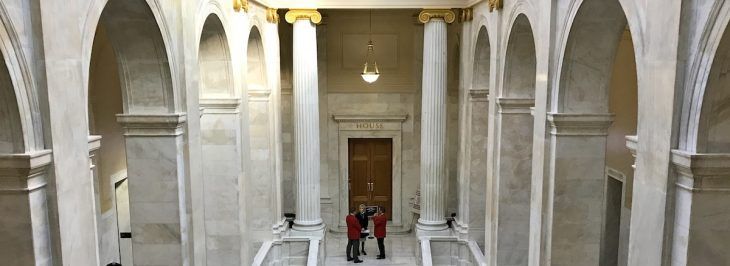Change would let speakers choose committees, legislators raise funds during fiscal session
by January 10, 2017 4:58 pm 226 views

The speaker of the House would appoint committee members under a resolution passed Tuesday (Jan. 10) by the House Rules Committee, while legislators for the first time would be able to engage in campaign fundraising during fiscal sessions.
Under House Resolution 1001 by Speaker of the House Jeremy Gillam, R-Judsonia, future speakers’ duties would include appointing representatives to certain committees. Standing House committees now are filled by a selection process where all legislators are divided by congressional district and meet in four separate rooms at the same time. Legislators choose their committees by order of seniority.
Current committees have been selected, so the rules change would not take effect for two years. Gillam has said he will not be a candidate for speaker in 2019.
The resolution could be considered by the full House Wednesday and requires a two-thirds majority to pass. The Rules Committee is composed of 12 Republicans and three Democrats and was appointed by Gillam.
The change would allow representatives to serve on committees where they have an interest and expertise, said House Majority Leader Mat Pitsch, R-Fort Smith. Pitsch said the past two sessions have featured a large freshman class where members were left off committees that would have been appropriate for them – for example, Rep. Justin Boyd, R-Fort Smith, a pharmacist, was unable to serve on the Public Health, Welfare and Labor Committee.
The House Rules Committee’s vice chair, Rep. Laurie Rushing, R-Hot Springs, said the rules change would give the speaker more flexibility. She said she served on the Aging, Children and Youth, Legislative and Military Affairs Committee during the last session despite a lack of interest or experience.
“I went. I attended. I was probably not effective,” she said. “I would have been a lot more effective on Insurance and Commerce where my business industry is.”
Rushing and Pitsch said the speaker of the House chooses committee members in most other states. Rep. Bob Ballinger, R-Hindsville, said the current system is “archaic” and “a mess.” However, he questioned giving that much power to future speakers.
“As a guy who has been kind of on the outside quite a bit, I’m a little concerned about centralized power – not under Jeremy because I respect Jeremy. I think he’s great,” he said. “But I don’t know who the politician is in the future who’s going to be speaker.”
The current process allowed Democrats this year temporarily to gain an 11-9 majority on the House Revenue and Taxation Committee, despite holding only 26 of the 100 seats at the time, by stacking it and sacrificing the other committees. That majority, however, ended in December when Rep. Joe Jett of Success switched from the Democratic to Republican Parties. Three post-election party-switchers have given Republicans a 76-24 majority in the House.
Pitsch and Rushing said the proposed rules change had been discussed prior to the Democrats’ stacking of Revenue and Taxation. House Minority Leader Michael John Gray, D-Augusta, said that event “may have illuminated this issue,” but what’s mainly happening is a political party with an overwhelming majority wants to ensure it maintains control.
“I respect the speaker’s eye on the process,” he said. “I think we all have to remember that when these rules go into effect, we will have a new speaker. We potentially could have new leadership, new members of the House. To set up a structure as which to seemingly vest all the power in the speaker is something that gives us some pause.”
The rules change also would allow House members to raise money for campaigns when the House is in fiscal session, which focus on budgetary matters and occurs in the early months of election years.
Rushing and Pitsch said the change would bring the House in line with the Senate and with constitutional officers, who are allowed to raise campaign funds during that time. Sometimes House members are running against those officials.
“We try to be fair when we write bills here,” Pitsch said. “I think (Gillam’s) trying to adjust to that inequality.”
